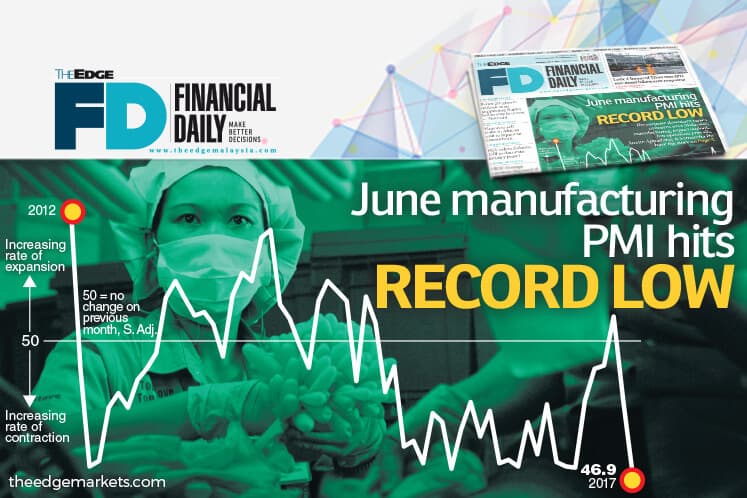
This article first appeared in The Edge Financial Daily on July 4, 2017
KUALA LUMPUR: Malaysia’s Nikkei Manufacturing Purchasing Manager’s Index (PMI) for June hit its lowest in five years since data for the index was first tracked in the country, falling to 46.9 from 48.7 in May, on lower output and a decline in new orders, raising concerns that the country’s manufacturing sector may deteriorate in the coming months.
“The decline in PMI this month [particularly for output and new orders], could possibly point to [a] sharper-than-expected drop in export sales in the coming months, but this remains to be seen,” said Sunway University Business School economics professor Dr Yeah Kim Leng.
However, he said the downturn may still be a one-off occurrence, and that the performance of the sector should be monitored.
When compared with Malaysia’s Asean neighbours, the country recorded the lowest index score last month among seven countries, including Philippines (53.9), Vietnam (52.5), Thailand (50.4) and Singapore (50.3), according to Nikkei’s Asean Manufacturing PMI report. Softer overall demand led Asean manufacturers to be cautious about purchasing activity, Nikkei said.
The PMI report, released yesterday, is a composite single-figure indicator of manufacturing performance, based on data collected from the 450 companies in Malaysia’s manufacturing sector and by IHS Markit Ltd, covering five key indicators including employment, output, new orders, stock of items purchased and supplier’s delivery time. An index reading of above 50 indicates manufacturing sector growth; a figure below that shows a contraction.
“Malaysia’s Manufacturing PMI sank to a record low in June, just two months after signalling growth in April. Sharper falls in output and new work were the main factors behind the sector’s plight. With underlying demand worsening, goods’ producers took steps to limit workforce growth and streamline inventories — employment stagnated and stocks of purchases fell at a survey record rate,” said Paul Smith, senior economist at IHS Markit.
“However, firms’ optimism was undeterred, with sentiment, instead, improving since May. A number of panellists predicted a turnaround in client demand,” Smith added.
That optimism is echoed by some economists that The Edge Financial Daily spoke to, who said the June PMI does not necessarily indicate that Malaysia’s manufacturing sector will see a setback as it was only a survey of 450 companies here. They also pointed to the encouraging export numbers seen to date.
“The sudden downturn in PMI is significantly lower than market expectations and is actually quite surprising. One month of decline in PMI should not cause panic, as exports have seen a steady [growth trajectory] [since last year], and we still expect solid growth numbers in June,” Affin Hwang Investment Bank Bhd chief economist, Alan Tan, told The Edge Financial Daily in a phone conversation.
“We expect the PMI to see an uptick by July of this year, [up to about 49] driven by consistent export numbers which should lift the sentiment of purchasers in the manufacturing sector,” Tan added. Malaysia’s exports in April 2017 grew by 20.6% year-on-year to RM73.97 billion, marking the fifth consecutive month of double-digit growth seen since December 2016.
Senior economist for Southeast Asia at Nomura, Eueben Paraceulles, also said the PMI data was surprising, given the strong regional exports Malaysia had been seeing.
“One factor [for the downturn] could have been the fewer working days this month due to Hari Raya Aidilfitri and [the] Ramadan period,” he said in a conference call yesterday on Malaysia’s economic outlook for the second half of 2017. Paraceulles expects to see a rebound in the PMI going forward.